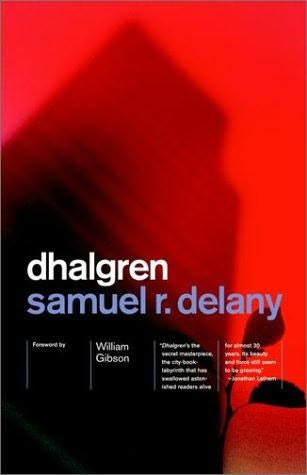
I can see why, for 1974, this book was so... groundbreaking. From a bisexual protagonist, to poly-amorous relationships, scenes of gang bangs we get a lot of racy imagery. Bellona, a city forgotten. Detroiters would be enraged by my drawn parallels, but I think it fits. Detroit pops up in the news from time to time, but like Bellona, it has decayed from its past splendor. Now, Detroit is not aflame, but we do get areas where no police will help you, street lights are more off than on; and justice has to be administered by those not of the legal system. I wonder if souls, like those found in this book, have wandered into Detroit to find themselves.
Our main character is without a name. Referred to as Kidd, because of his boyish appearance, he has journeyed to Bellona out of curiosity; and with goals. The book opens; we find out at the end, mid-sentence and mid-dream. "to wound the autumnal city. So howled out for the world to give him a name. The in-dark answered with wind."
It reads like poetry, and leaves questions steeping on your mind for pages to come. I love the first few pages, we get this wonderful imagery of lost speech stolen by winds wrath, and a melding of two passionate bodies. Knowing later that this is assumed to be a dream is a bit shocking; as I assumed it was not. We get this fantastical start to the book; since it is sci-fi it did not strike me as odd.
Kidd, after his racy orgasmic pleasure filled voyeur begins venturing into a case, and our first motif surfaces; chains of prisms, mirrors, and lenses. Once he makes it to Bellona we see them occurring on a plethora of people; and there is a mystery behind them. We get discussion of taking them off, an unwillingness to say where you got them, and a respect engendered amongst those who wear them. Kidd talks late in the book of trying to get Lanya, his primary female sexual partner, to wear them, but is met with resistance. At the end of the book, when in counsel with Madame Brown, we find out that Kidd and Madame Brown’s first encounter, which seemingly centered around their common chains, was a farce. She chose him because of his similar appearance to a patient she had in the past.
Kidds lack of name and memory is central to the book. We are constantly reminded of his forgetfulness. At times he goes missing for a week; but claims he was only gone for a day. His being such an unreliable narrator is distressing. So much of the book could be for naught, a dream, as reflected in the first/last chapter.
In the last chapter we get a look into the writing process of Kidd. Titles "The Anathemata: a Plague Journal" we get completely disjointed stories and an equally disjointed telling of the book. There are writing interrupted with future or past writings, and it is supposed to mimics how Kidd wrote it in his journal. We get unfinished stories, author (Kidd) omissions and edits, and stories that start up mid-sentence. The start of the book does this, and I was left wondering it and where this journal style ended. Is dhalgren the journal by Kidd, or is it the novel by Delaney. I'm sure the question has been asked before, but I don't seek the answer.
Kidd is a poet, and so is Delaney. dhalgren breaks from simple dialogue or prose into full blown poetry, then re-enters dialogue. We get the inner working of the poet Kidd through this method, and the language is beautiful. I would be interested to read "Brass Orchids" the published poems of Kidd. We get to hear (read) them as they are written, but to see the finished work would be a joy.
Kidd is a very complex character, surrounded by others of the same caliber. A native American, or Indian as written in dhalgren, he also identifies as bisexual, poly-amorous (though not by that name) and as a poet. He is constantly trying to not identify himself as a crazy person. We get the many sexual encounters with above mentioned flavors; most with Lanya and Denny. We also get self-doubt from Kidd about his own bisexuality, which is beneficial to see. We also get questioned jealousy about Lanya, and Denny's relationship, a common concern in poly relationships.
For these reasons, I reiterate, I can understand why this book is lauded. The writing is stunning, poetry then prose mingles throughout the entire book.
There is much that happens that I have not written. Pick up dhalgren, read the first chapter and watch as pages fly. A mysterious book, which does not provide nearly as many answers as it does questions. There is a marvelously painted world to immerse yourself in though. William Gibson writes that "dhalgren is not there to be finally understood... its riddle was never meant to be solved." And I think through this "lens, prism or mirror" dhalgren is fantastic.
~JK
note: dhalgren inspired me to write poetry again.
© JKloor 2014 Books
